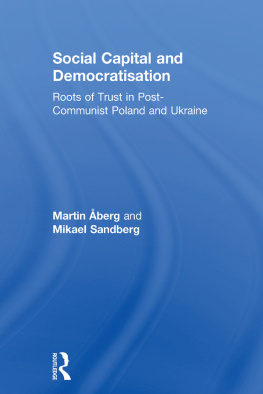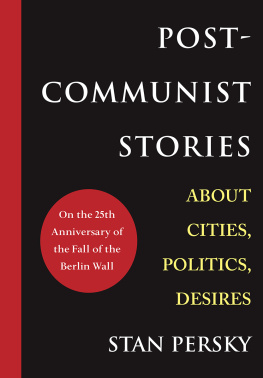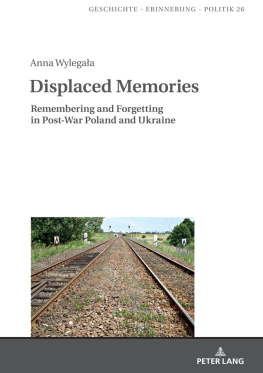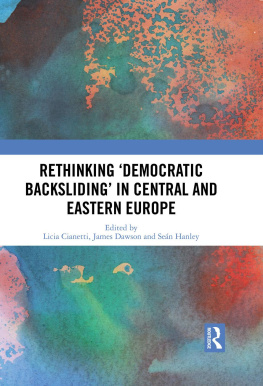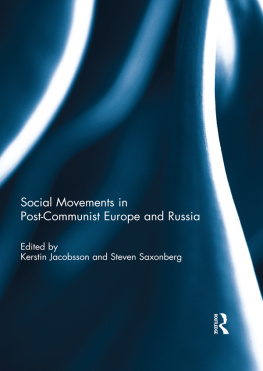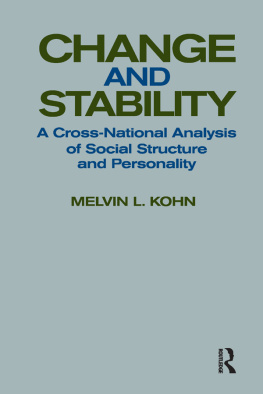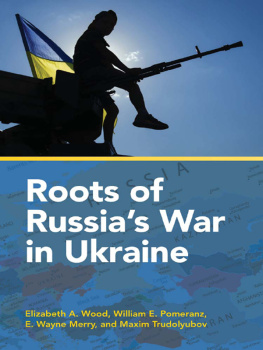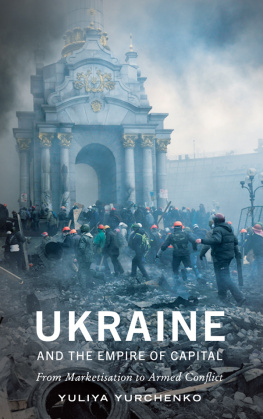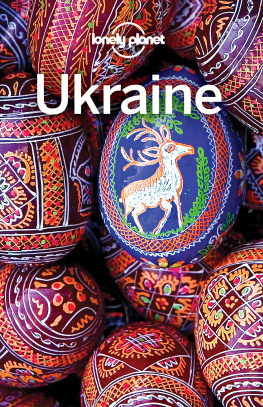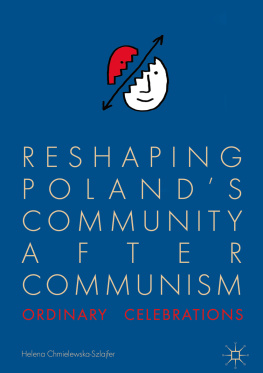SOCIAL CAPITAL AND DEMOCRATISATION
Social Capital and
Democratisation
Roots of trust in post-communist Poland and Ukraine
MARTIN BERG
University of Trollhttan-Uddevalla, Sweden
and
MIKAEL SANDBERG
Halmstad University College, Sweden
First published 2003 by Ashgate Publishing
Published 2017 by Routledge
2 Park Square, Milton Park, Abingdon, Oxon OX14 4RN
711 Third Avenue, New York, NY 10017, USA
Routledge is an imprint of the Taylor & Francis Group, an informa business
Copyright Martin berg and Mikael Sandberg 2003
All rights reserved. No part of this book may be reprinted or reproduced or utilised in any form or by any electronic, mechanical, or other means, now known or hereafter invented, including photocopying and recording, or in any information storage or retrieval system, without permission in writing from the publishers.
Notice:
Product or corporate names may be trademarks or registered trademarks, and are used only for identification and explanation without intent to infringe.
British Library Cataloguing in Publication Data
berg, Martin
Social capital and democratisation : roots of trust in
post-Communist Poland and Ukraine
1. Democratization Poland 2. Democratization Ukraine
3. Social capital (Sociology) Poland 4. Social capital
(Sociology) Ukraine 5. Post-commun ism Poland
6. Post-communism Ukraine 7. Trust Poland 8. Trust
Ukraine
I. Title II. Sandberg, Mikael
320.9'438'09049
Library of Congress Cataloging-in-Publication Data
berg, Martin, 1962-
Social capital and democratisation : roots of trust in post-Communist Poland and Ukraine / Martin berg and Mikael Sandberg.
p. cm.
Includes bibliographical references.
ISBN 0-7546-1936-2 (alk. paper)
1. Democratization--Poland. 2. Democratization--Ukraine. 3. Social capital (Sociology)--Poland. 4. Social capital (Sociology)--Ukraine. I. Sandberg, Mikael. II Title.
JN6766 .A242002
320.9438dc21
2002027918
ISBN 13: 978-0-7546-1936-9 (hbk)
AWS Solidarity Electoral Action
ChKw Christian Election Coalition
CIS Commonwealth of Independent States
CPSU Communist Party of the Soviet Union
CPU Communist Party of Ukraine
CREES Center for Russian and East European Studies, Michigan University
CSES Comparative Study of Electoral Systems
DemPu-NEP Electoral bloc of democratic parties
FPTP First past the post (majoritarian electoral system)
GUS Polish Central Statistical Office
IFES International Foundation for Election Systems
ISS Institute of Social Studies, Warsaw University
KOR Committee for the Defence of Workers
KPEIR Pensioners Party
KUN Congress of Ukrainian Nationalists
MZO Ministry of the Recovered Territories
NGO Non-governmental organisation
OUN Organisation of Ukrainian Nationalists
PGSS Polish General Social Surveys
PPR Polish Workers Party
PPS Polish Socialist Party
PSL Polish Peoples Party
PZPR United Polish Workers Party
RFE/RL Radio Free Europe/Radio Liberty
ROP Movement for Reconstruction
SPU-SelPu Electoral bloc of the Socialist party and the Agrarian party of Ukraine
SLD Democratic Left Alliance (Social Democrats)
UHU Ukrainian Helsinki Union
ULS Taras Shevchenko Ukrainian Language Society
UNDO Ukrainian National Democratic Alliance
UP Union of Labour
UPA Ukrainian Insurgent Army
UPR Union of Real Politics
URP Ukrainian Republican Party
UW Freedom Union
UVO Ukrainian Military Organisation
WPW Unity Choice of Wrocaw
ZO Recovered Territories (formerly German lands in western and northern Poland)
Restaurant NN in Lviv, February 1998. Set in the midst of the historical quarter of the city, the place revealed all the usual post-Communist bric--brac typical of transitional societies in East Central and Eastern Europe (in contrast to the slowly fading bric--brac of the previous Communist period lack of coherence in taste seems to be the ultimate indicator of societies in transition). There was the glossy furniture and bright colours set in sharp contrast to the grey dullness of our local hotel, the shiny suits of local businessmen, the short-skirted waitress, pop music pounding. What captured our attention more than anything else, however, was the remarkable apparition of meat eventually presented to me (Mikael had the good fortune of ordering fish). Against my better judgement, it would prove, I had ordered as we now recall it a Tropical Schnitzel. Pork dressed with egg and breadcrumbs appeared, accompanied by the usual selection of vegetables and fries. So far, so good. Presiding on top of the meat, however, were four or five spongy lumps that we, with some difficulty, identified as deep-fried slices of orange and pineapple. Sacrilegious as it might have been treating the poor hog this way it nevertheless struck us that a Tropical Schnitzel actually captures the essence and dilemma of post-Communist democratisation.
Firstly, like the habit of eating, democratisation is a process that concerns the basic needs and desires of people. Democratisation certainly has much to do with aspects of institutional reform, party politics and as in Ukraine state-building. Besides these more abstract problems the basic fact remains, however: that democratisation, to a considerable extent, is something that involves everyday life and society itself, down to the most trivial aspects of social life. As we need to eat to be able to carry out our daily business, so democratisation is also very much about the everyday modes and practices of how we carry on in our endeavours, individually or in cooperation with others. Needless to say we approach aspects of social life that are non-reflexive equally as often as they are made subject of conscious and critical reflection. Secondly, precisely because of this, the results of social and institutional innovations in post-Communist societies are, like the Tropical Schnitzel, usually paradoxical, often amusing and occasionally tragic. Only up to a point are constitutional reforms and new modes of civic practice the results of a deliberate and rational choice between various, and scientifically evaluated alternatives. Once such new rules of the political game have been laid down firmly, the social action that follows can certainly be analysed in terms of rationality and irrationality. However, at the crucial point in time when the actual choice between different institutional arrangements, informal as well as formal, is being made the weight of previous experiences and legacies of the surrounding social and cultural environment make the choice path dependent. Thus the logic that marries a schnitzel with deep-fried fruit is also part of the logic that makes Ukraine choose, let us say, a semi-presidential political system inspired by the French Constitution on the basis of the Soviet heritage rather than an outright parliamentarian solution to the problem of democratic government.
Hence a note on where the basic ideas underpinning this book came from. From the dinner table to final product, however, we have been treading the usual narrow and often tedious path typical of academic scholarship. Entering the problem of democratisation from different disciplines in my case the arts and, more specifically, history, and in Mikaels case the hard core social sciences, more specifically political science we have tried to blend the best of our disciplines while attempting to avoid the worst they have to offer. As our scholarly concerns, fortunately enough, have become increasingly intertwined during the project, we also find it somewhat difficult to distinguish between what has actually been done by whom. However, simplifying somewhat, let us say that whereas , were written mostly individually by, in the first case me and, in the second case, Mikael. While I initiated the project, managed the integration of work and texts and pursued the historical approaches to the two-city and -region case studies, Mikael contributed elements from political science, such as social capital and institutional theory (including his evolutionary variant of it), as well as the quantitative methodology. Whether we will, to some small extent, succeed in making readers happy with our theory, methods and results must be the task of others to determine. In any event we immensely enjoyed making this truly interdisciplinary analysis. Also, the mere fact that we came this far at all is to a considerable extent a combination of fortunate factors that happened to converge in the late 1990s, some of which were as they say beyond our control.


